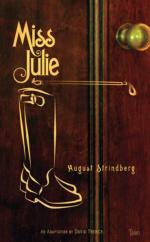|
This section contains 569 words (approx. 2 pages at 400 words per page) |

|
Miss Julie Summary & Study Guide Description
Miss Julie Summary & Study Guide includes comprehensive information and analysis to help you understand the book. This study guide contains the following sections:
This detailed literature summary also contains Bibliography and a Free Quiz on Miss Julie by August Strindberg.
First published in 1888, August Strindberg's Miss Julie shocked early reviewers with its frank portrayal of sexuality. Although it was privately produced in Copenhagen, Denmark, in 1889, the play was banned throughout much of Europe and was not produced in Sweden, Strindberg's native country, until 1906 Britain's ban on public performances of the play was not lifted until 1939. Notoriety is often the best publicity, however, and the play soon gained an underground popularity in both Europe and America; mainstream acceptance and success came a bit slower, but by the early twentieth century the play was considered an important facet of modern drama.
The root of contention over the play stemmed from its frank portrayal of sex. Not only does Miss Julie contain a sexual encounter between a lower-class servant and an upper-class aristocrat (in itself outrageous for the times), the play clearly describes the sex act as something apart from the concept of love. The idea of intercourse based completely on lust was scandalous to late-nineteenth century thinking and enough to provoke censure. And it was nothing more than the idea of sex without love that caused the trouble: the act is only referred to in the play, not actually depicted on stage.
Strindberg's drama focuses on the downfall of the aristocratic Miss Julie, a misfit in her society (the author refers to her in his preface as a "man-hating half-woman"). Julie rebels against the restrictions placed on her as a woman and as a member of the upper-class. From the beginning of the play, her behavior is shown to alienate her peer class and shock the servants. She displays a blatant disregard for class and gender conventions, at one moment claiming that class differences should not exist and the next demanding proper treatment as a woman of aristocracy. Her antics result in her social downfall, a loss of respect from her servants, and, ultimately, her suicide
Miss Julie is widely regarded as the most important drama to come out of the literary movement known as naturalism. The movement was based largely on the theory of social Darwinism, which proposed that individuals fight for position in society much as animals fight for their survival in the wild, and that, in humans (as in animals) only the fittest can survive (this theory is known as "Natural Selection" and was first proposed by Charles Darwin). As a naturalistic drama, Miss Julie focuses on Julie and Jean's struggle for survival in their society. Stnndberg claimed that the basis for the plot of Miss Julie was a true story he had heard of a young noblewoman who had had sexual relations with a servant, although that young woman did not commit suicide. Strindberg lived in a time in "which gender and class roles were becoming more fluid, and the play reflects the conflicts that are inevitable in a society struggling with change.
Today Miss Julie is regarded as remarkable for the same reason early critics and censors found it so shocking: it is the first play in which sex is separated from love. Stnndberg's portrayal of the strength of sexual desire (and the often calamitous situations that result when one surrenders to such desires) strongly influenced later playwrights, most notably Tennessee Williams {Cat on a Hot Tin Roof). Although the play's importance was not widely recognized during Strindberg's lifetime, its place in modern drama, particularly as an example of naturalism, is now virtually undisputed.
Read more from the Study Guide
|
This section contains 569 words (approx. 2 pages at 400 words per page) |

|



